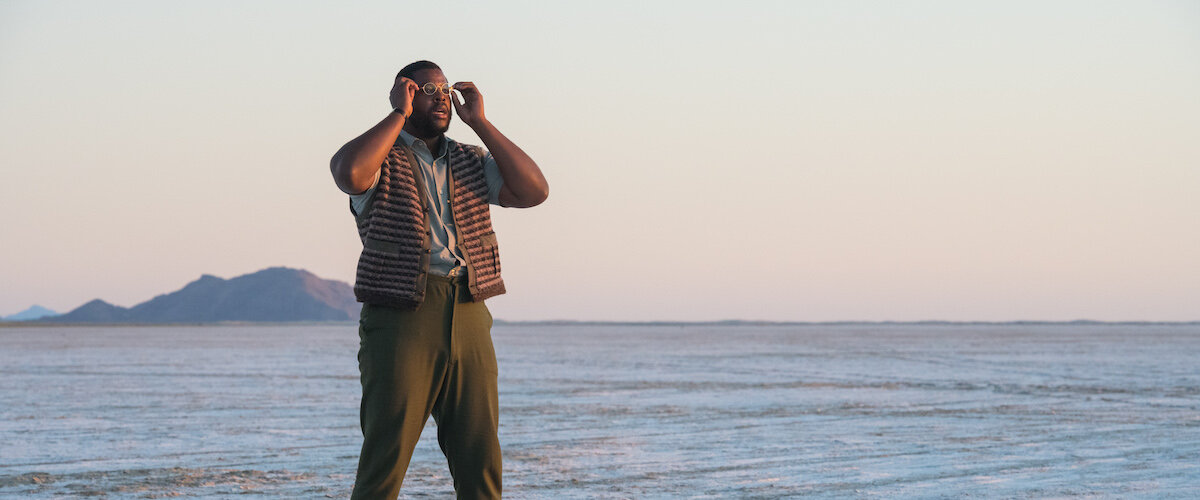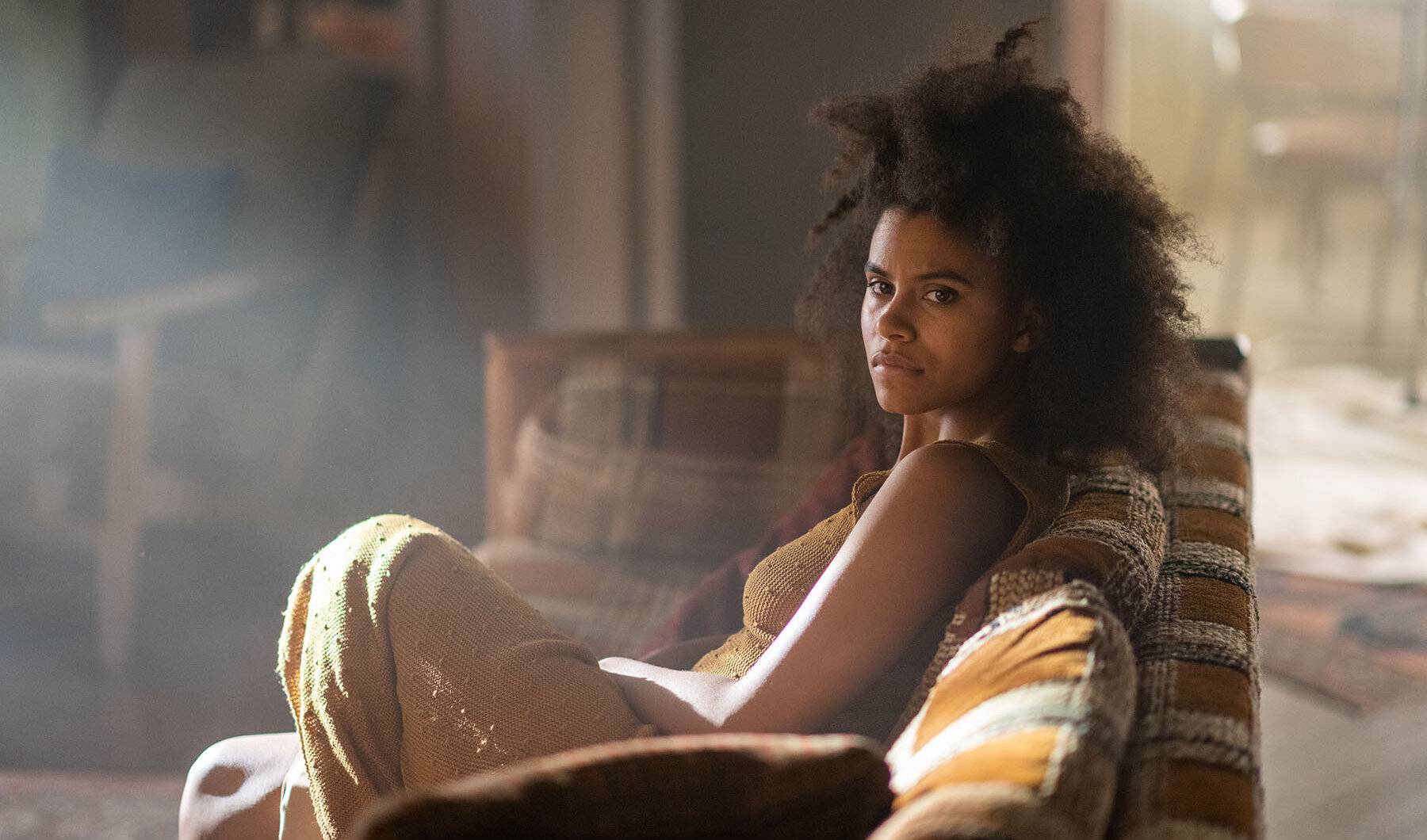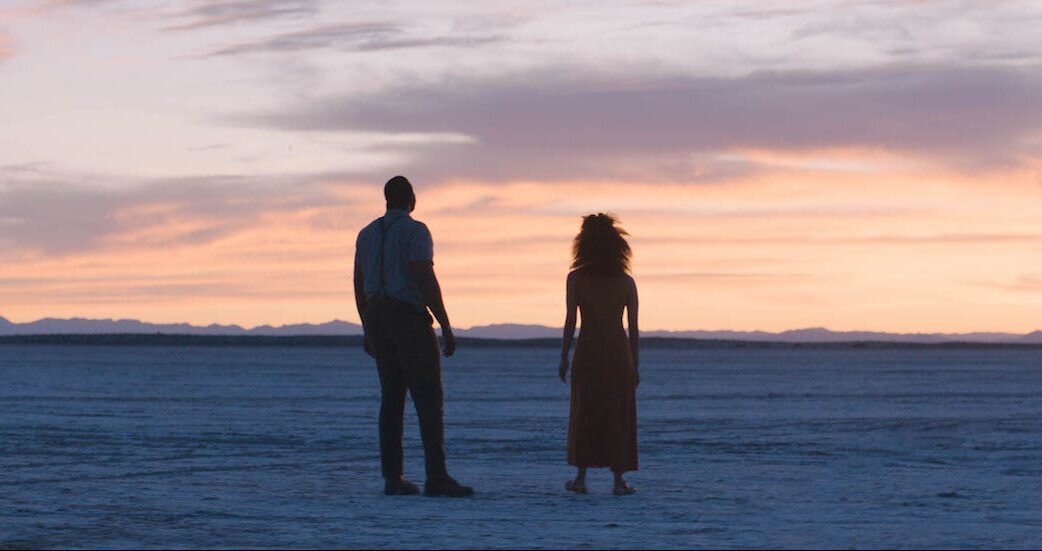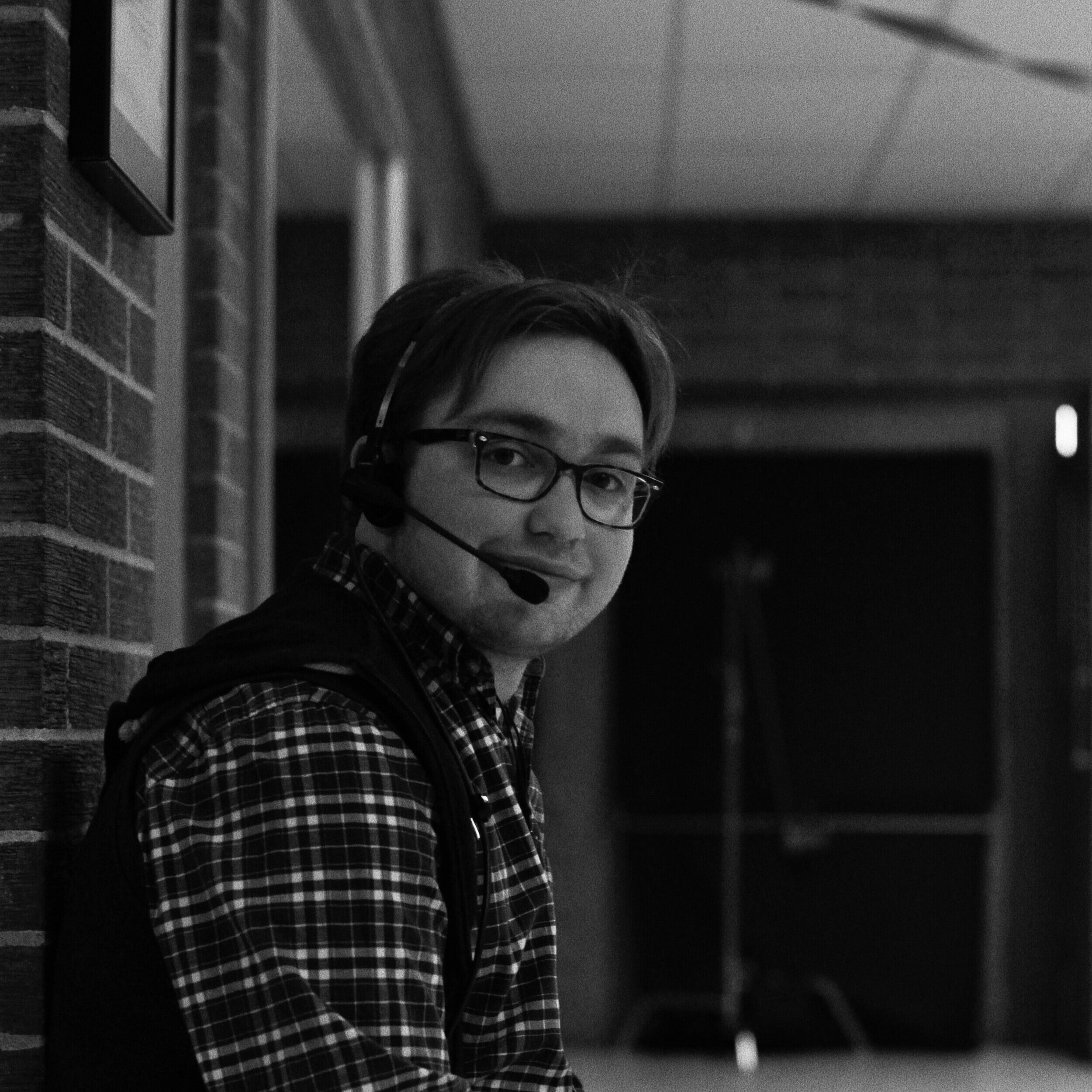Nine Days (2021): The Opportunity of a Lifetime
Courtesy of Sony Pictures Classics
By Nick Sansone
I’ve been lucky enough in my adult life to have had several hard-to-forget (in a good way) moviegoing experiences. Seeing La La Land (2016) on Christmas Day with my family is one I won’t soon forget if only for how joyously overwhelmed I was by it. Getting to see Paul Thomas Anderson’s Magnolia (1999), my second-favorite movie of all time, in 35mm with John C. Reilly in attendance in 2018 (during a brief period as a Los Angeles resident) is one I will also likely never forget. And being able to see the first film I reviewed for The Baram House way back in March of 2020, Trey Edward Shults’s Waves (2019), in a theater shortly before theaters were all shut down, is an experience I will always hold dear. But perhaps the most unforgettable experience I have had in a movie theater in the last two years (at least) was at the 2020 Sundance Film Festival.
While I saw quite a few great films at that festival (including the wonderful Minari (2020)), none of them overwhelmed me as much or moved me as deeply as Edson Oda’s incredible debut feature Nine Days (2021), which has finally been given a proper theatrical release more than 18 months after its Sundance debut. The film’s logline in the festival program intrigued me, and I ended up scoring a ticket on the waitlist to its second screening at the festival (a 9 AM screening, no less). Seated in the massive sold-out Ray Theatre, I truly felt part of a huge communal experience, where over five hundred people were on the exact same wavelength experiencing this ethereal, incredibly intelligent and emotionally-powerful existential drama. This is a film that manages to entertain while provoking intense melancholy and ultimately profound joy and appreciation for the very experience of life, and one that demands to be experienced in a movie theater if at all possible.
The film takes place in the middle of a desert landscape, where a nondescript house sits occupied solely by a man named Will (Winston Duke), whose job is to interview souls (seen in human form throughout the film) for the chance of being born into life. The interview process lasts a maximum of nine days, and at the end, only one soul is selected to inhabit a body in the living, and those who are not selected are given the opportunity to relive a favorite moment from the selection process one last time before they disappear forever. After selecting the chosen soul, Will can then track their life on one of a variety of old television monitors set up in the living room of his house. When we first meet Will, he is particularly drawn to the life of Amanda, and becomes depressed when she is killed in a car accident (the details of which become clearer as the film progresses).
Courtesy of Sony Pictures Classics
With a life vacancy available, Will sets out on a new interview process all the while grieving and obsessing over Amanda’s loss in not-so-healthy ways. While several souls interview for this position and many of them are dismissed early on, a few make it far and impact Will in different ways: Alex (Tony Hale), a sensitive man with a hardened façade, Kane (Bill Skarsgård), a negative man with a justice-driven mindset, and finally Emma (Zazie Beetz), a highly intelligent and empathetic young woman whose very nature is disarming to Will. His interactions with these souls, as well as his only friend Kyo (Benedict Wong), who, in many ways, serves as an assistant in Will’s selection process, ultimately force Will to confront his own grief and trauma in a profound manner that has implications for both his ultimate selection and views on life overall.
This is about as far as I’m going to go into the plot, as many of you reading this right now are probably perplexed by much of what I have described. Yes, this is a deeply existential film with many ideas that may make it seem like an inaccessible head-trip. However, much like other existential crowd-pleasing films such as Albert Brooks’ Defending Your Life (1991), Eternal Sunshine of the Spotless Mind (2004), and even Pixar’s Soul (2020), Nine Days (2021) never allows this film’s premise or ideas get in the way of making you care deeply about its characters and becoming deeply invested in their journeys. Its combination of deliberate pacing, real human emotion, and even some great moments of humor (particularly one scene that takes place during a backyard dinner) make this a film that can — and should — appeal to viewers from all backgrounds and life experiences.
From the very start of this film, when we see Amanda’s life lived from her first-person perspective, writer/director Oda immediately positions this film as a personal viewing experience for all audience members. This extends further to the other people’s lives shown on the televisions and the film’s central interview process, where people’s lives presented and the souls being interviewed embody a collective diversity that truly resembles life, not just in terms of skin color or gender but in terms of personality, thought process and the way we respond to certain situations. One of the early highlights of the interview process comes when Will presents each of the interviewees with an impossible hypothetical scenario. Will tells them to imagine their son is in a concentration camp and is caught attempting to escape. The son is about to be hanged by a sadistic guard who gives the interviewee a choice: either pull the chair or your son and all of the prisoners will be killed. What seems to be an unfair catch-22 hypothetical turns out to be crucial to Will in considering how each of these souls can handle the harsh realities of life. It’s equal parts sobering and fascinating.
Courtesy of Sony Pictures Classics
Just as fascinating is the film’s portrayal of Will. As both the protagonist and the arbiter in this interview process, the film treats him with both empathy and a distance that allows the audience to come to their own conclusions regarding his various decisions. There is never a pat explanation given for why he chooses not to select certain interviewees or even why he does select the one he ultimately does. But what this vagueness ultimately accomplishes is mirroring the very process of life in practice, where there are oftentimes vague reasons for why certain events unfold, for why the desires of our heart may not often come to fruition, and for why people who we think we know make decisions that confound us. Having said that, as the film progresses, the wall that Will has built up around himself slowly begins to collapse and we fully see that Will’s damaged and wounded nature goes far beyond his grief over Amanda’s death. So while the ultimate explanation is still vague, the audience gets some understanding that Will’s decisions stem from his hurt and brokenness, just like much of what happens in life stems from people’s hurt and brokenness.
And channeling Will’s hurt and brokenness in an incredibly powerful way is Winston Duke, whose performance should solidify his status as a leading man to be reckoned with. Having only seen him previously in Jordan Peele’s Us (2019) and Black Panther (2018), as well as the final two Avengers films, I had never really gotten to see the full depth of his acting ability, but it absolutely shines through here. In the more understated moments, Duke shows a broken, isolated man who has shut the world out and stuffed his pain. In unexpected moments, such as when he presents the concentration camp hypothetical to the interviewees, he allows the audience to see glimpses of where this pain has come from. And finally, in the film’s final moments (which I wouldn’t dream of spoiling), he allows both his character and the audience a beautiful catharsis that will stay with you long after the film ends.
Adding to the power of Duke’s performance are the supporting players surrounding him. Benedict Wong is especially memorable as Kyo, owning many of the film’s comic relief moments and providing a great foil for Duke’s Will. Tony Hale has one of the strongest moments of the supporting cast as Alex, going toe-to-toe with Duke in a powerful scene that I still think about often. More understated is Bill Skarsgård as Kane, channeling both cynicism and intelligence in a way that stands out from the rest of the interviewees. And Zazie Beetz, in what may be her best role outside of the television series Atlanta, provides another brilliant foil for Duke’s Will, holding her own in subtle but incredibly convincing ways all through the film’s exquisite final scene.
Courtesy of Sony Pictures Classics
Contributing equally to the cumulative power of this film are the cinematography and soundscape, which beg to be experienced in a theater if at all possible. This is perhaps what stuck with me the most upon my initial Sundance viewing, as the film’s vast desert imagery and more intimate shots of the old televisions washed over me on that cold morning in Park City, Utah. For a film to feel both vast in scope and intimate in nature is incredibly difficult to pull off, but Nine Days (2021) manages to accomplish it. Oda and cinematographer Wyatt Garfield portray both the vastness of the desert landscape and the intimacy of Will’s house with exquisite skill, meeting both feelings in the moments where Will recreates certain instances in his home studio, moments where the film’s technical nature and deep ideas meet to form a powerful emotional impact. And none of this is to mention the sound design and score by Antonio Pinto, which puts heavy emphasis on the violin (the instrument Amanda played professionally), only adding to the overall sense of melancholy that permeates the film.
Watching Nine Days (2021) again at my local multiplex more than 18 months after seeing it at Sundance, I couldn’t help but notice that, as much as it impacted me there, it only hit me harder emotionally a year and a half later. Perhaps it has to do with the global events that have taken place since then that have no doubt raised existential questions about the meaning of life and how to live it. Or maybe it’s because of events in my personal life that have forced me to come to terms with my own pain just like Will does in this film. Either way, this is a film with an emotional power that only increases with time, and after the death and despair that’s been experienced recently both in the United States and internationally, a film that ponders and, ultimately, celebrates the very experience and opportunity of life itself is something that demands to be seen and experienced by everyone. Because as Will eventually comes to realize, the beauty in life is always greater than the hurt and brokenness within.
Nick Sansone is a writer and aspiring filmmaker from Chicago. A recent summa cum laude graduate of DePaul University’s School of Cinematic Arts, he continues to study film independently and has appeared on different radio programs in the Chicagoland area to discuss contemporary cinema and the Academy Awards.






